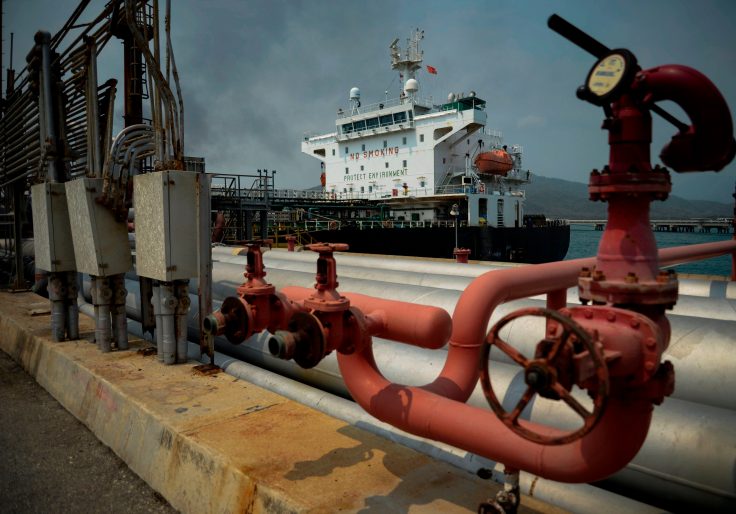Illicit Iranian oil sales have hit $90 billion under the Biden administration, with the proceeds helping Tehran’s regional terror proxies fund an unprecedented wave of attacks on Israel, American forces, and Western shipping vessels.
Tehran’s sales to China, its top importer, have consistently crossed more than 1 million barrels per day during the past several months, a signal that the Biden administration continues its softline approach toward enforcing sanctions on the regime’s oil exports.
"Iran has managed to sell $90 billion worth of U.S.-sanctioned oil, setting new export records in the process," according to the latest figures published by United Against a Nuclear Iran (UANI), a watchdog group that monitors Tehran’s illicit oil trade. "Ongoing hesitance to enforce oil sanctions on Iran has proven to be a defining characteristic of the Biden Administration’s foreign policy."
Tehran’s oil exports continue to soar as its terror proxies in the region—including the Houthi rebels in Yemen and Iraq-based militant groups—work to choke off international shipping lanes and attack Western ships. This situation has prompted the United States and its allies to conduct a series of retaliatory strikes. Amid this conflict, Iran’s fleet of illegal oil tankers have delivered the country’s heavily sanctioned crude to China, Syria, Venezuela, and other nations.
"While global supply routes have been seriously affected by the Houthi attacks, Iran’s oil trade, especially to its number one importer, China, has continued unabated," UANI reported in early February, shortly after a Houthi-orchestrated attack killed three American service members. "For January 2024, Iranian exports to China hit 1 million barrels per day. The revenue from these sales is fundamental not only for the regime’s survival but also as a critical source of funds disbursed to its terror proxies, including the Houthi movement in Yemen."
Exports to China rose even higher in February, hitting 1,462,257, an increase of more than 300,000 barrels per day from January, according to the latest figures published last week by UANI.
The revenue from these sales, which is estimated to be around $66 million in February, has served, according to UANI, as a central financial lifeline for Tehran as it sends its global terrorism enterprise into overdrive following Hamas’s Oct. 7 terror strike on Israel, an operation that was directed and funded by the Islamic Republic.
The rise in exports has been accompanied by a massive expansion in Iran’s fleet of oil tankers, known as its "ghost armada" due to the vessels’ efforts to evade international detection.
In 2020, around 70 ships were suspected of transferring Iranian crude products across the globe. Just three years later, after the Biden administration took office and reversed the United States' "maximum pressure" campaign on Tehran, that fleet has grown to at least 395, according to UANI.
"This suspected ghost armada, distinct from but complementing Iran’s own NITC tanker fleet, has skirted U.S. sanctions and exploited regulatory loopholes to ship millions of barrels of Iranian oil," the group reported last week alongside a list of the suspected Iran-tied tankers.
Claire Jungman, UANI’s chief of staff, said the expansion of Iran’s oil fleet "is a stark reminder of our collective failure to enforce the rules that bind us."
"It is crucial that the United States prioritizes the identification and sanctioning of these vessels to effectively crack down on Iran's illicit oil trade," she told the Washington Free Beacon. "Immediate, decisive action is required to reinforce the sanctions framework and prevent the further erosion of global security. The time for half-measures has passed."
Concerns about the United States’ lax enforcement of sanctions have risen as the Biden administration begins to target Russia’s energy trade as punishment for its ongoing war in Ukraine.
Late last month, the Treasury Department published an in-depth assessment of U.S. sanctions on Russia’s oil and energy trade, highlighting the administration’s efforts to enforce economic penalties on Moscow.
But the administration has not done the same for Iran, leading groups like UANI to speculate that oil sanctions on Tehran remain a low priority.
"The administration has not published a correspondingly detailed report with respect to Iranian oil exports—despite the equally vital role oil sales play in funding Iran’s malign activities: sponsorship of terrorism, development of WMDs, and domestic repression. There is a conspicuous absence of robust pronouncements and clear-eyed reasoning with respect to Tehran and its oil," the group said.
"This is a regrettable data point that clearly inhibits the publication of administration reports on Iranian oil, in contrast to February’s report on Russia," UANI said.
